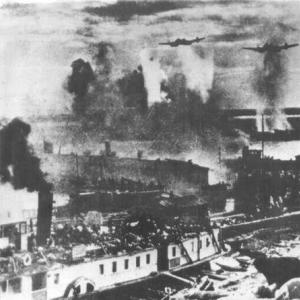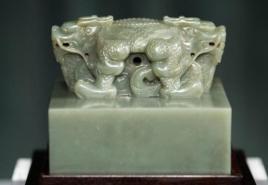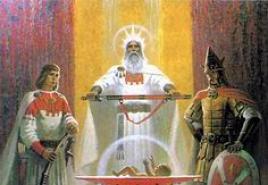Who is Yesenin poet or writer? Nine myths about Yesenin
Every genius has a life - and there is a destiny. A real biography with dates and facts - and many legends and myths with versions, speculations and fictions. Especially if the genius did not die in his bed, “with a notary and a doctor,” but killed himself or was killed. This “or” has become the subject of discussion and research since the end of the 80s of the XX century and up to now, the reason for the statement that in 1925 in Leningrad in the hotel “Angleterre” the 30-year-old poet was killed by the Chekists. Although this version was born almost immediately after his death. The newspaper "Slovo" immediately reported on the murder of Yesenin, the writer Boris Lavrenyov called in an obituary to "name him executioners and murderers", even the book "The Murder of Yesenin" was published.
In addition, the poet was then secretly buried in his homeland, in the village church, although it is forbidden to burial for suicides. And on October 3, 1991, on Yesenin's birthday, a memorial service was already "officially" served for him in Moscow, Leningrad and Konstantinov. One more fact "for" the murder.
But why "remove" Yesenin? Yes, and leave traces and terrible posthumous photographs of the poet with a disfigured face, a wound on his arm? Did he interfere with the authorities? However, in 1929 his museum was closed, and even in the 50s Yesenin was “banned”, my father was expelled from the university for reading his “decadent” poetry. A "case" of September 6, 1925 was opened against Yesenin (by the way, who was under external supervision), closed only posthumously, and he was afraid of the Chekists in the last years of his life, although he was friends with them. After the death of the poet, his sister Yekaterina was repressed, and in 1937-1938 his closest friends, especially in recent years, and the son from his first marriage, 22-year-old Georgy (Yuri), were shot. And there was also a massacre in 1939 with Zinaida Reich, his second wife ... She was going to write her memoirs, the whole truth about Yesenin, which, as she shouted at his funeral, no one knows.
“When I'm drunk, I think God knows what,” the poet himself admitted. Just what could he have dreamed of being alone (in Moscow his relatives tried not to leave him alone), in an unheated, cold Leningrad room? And whether he was drunk - he came to Leningrad not to drink, but to work, asked to send there a layout of the first collected works in his life. In general, he wrote a lot in 1925, and everything is the best.
We can say that no one knows the truth about Yesenin's death to this day, 85 years later: both versions raise too many questions. The poet himself wrote: "On a green evening under the window I will hang myself on my sleeve." But there are other lines: "And you need to hang me first, crossing my arms behind my back: for the fact that with a hoarse and sickly song I prevented my native country from sleeping."
From "cherub" to bully
Personalities of this magnitude are inevitably subjected to "retouching" or even "coloring" during their lifetime. So, a village boy from the Ryazan region, who arrived in the capital for glory, quickly began to paint "under a splint": a rural cherub, a kind of shepherd darling, "yellow-haired, with blue eyes", writing poetry "clear and clear", according to Alexander Blok, the first to greet the peasant nugget. Yesenin, patronized by "muzhikovstvuyuschih" writers-village breeders, willingly played along at first - he spoke, pushing on "o", crossed himself, wore sandals, boots and shirts with a belt, adored tea from a samovar, played the accordion-accordion and sang Ryazan ditties. Then Yesenin did not drink so much yet. He married early, at the age of 19 he became a father.
Best of the day
Yesenin was perceived as a peasant Orpheus, a bright, pure singer of Russia, a village, weeping willows, fallen maples and white birches, a poet “for good gentle girls”. And crowds of girls screamed at his performances: "Dushka Yesenin!" He himself later called himself "God's pipe": "This is when a person spends from his treasury and does not replenish." That, early Yesenin, Mayakovsky called "decorative peasant", operetta, sham, and his voice - "revived lamp oil." Yesenin soon gave up "bast shoes and comb-cocks." Yes, and "divine" ... He wrote obscene verses on the wall of the Passionate Monastery and, having split the icon, he could heat a samovar with it, and he could also light it from an icon lamp.
He led the Imagists (a new free-thinking movement in poetry), began to wear a jacket and tie, top hat, cane, hats and fashionable boots. He performed a lot with poems and poetic declarations, edited, read a lot, wrote clever, brilliant articles.
There are friends around him again, more often in quotation marks, striving again to make him "their own" - Imagists, Vappians, Lefovites ... Where are they now with their "creativity"? His whole life was pulled in all directions - hangers-on, stuck, ate and drank at his expense, provoking him into noisy tavern scandals and with petty, petty pleasure contemplating the "black man" awakening in him in a hop, and then spreading gossip about him throughout Moscow. They envied him - the idol of the public, the favorite of the ladies, married Isadora Duncan, went abroad, returned fashionable, elegant.
"No wife, no friend"
In fact, all his life he was lonely and for all his publicity and super-sociability he did not have real loyal friends: “And there is no wife or friend behind the grave,” he predicted. And in the last poem he turned to a friend rather unknown and desirable than real: "Goodbye, my friend ..." And earlier he wrote: "Among people I have no friendship."
It was even more difficult with women and wives. Everyone and always loved him, anyone - violent, drunken and hungover, loved both gentle and boor (and he, alas, knew how to be: “Sergei is a boor,” wrote even Galina Benislavskaya, who adored him, who shot herself at his grave). “Despite all the wounds, all the pain, it was still a fairy tale,” this girl, who became close to Yesenin in his last years, admitted in her memoirs. She was nothing to him - and everyone: friend, assistant, mistress, nanny, searched for in pubs and pubs and literally dragged her home - he obeyed her and never raised his hand against her. He lived with her, until his death without having an apartment, his own corner - until his marriage to SA Tolstaya, the granddaughter of the "great Leo".
This marriage surprised many: not a beauty and certainly not according to Yesenin's taste. But she was the granddaughter of a "beard" - so Yesenin called Tolstoy, not without irritation: in Sophia's apartment there were portraits of his grandfather everywhere, and she herself, according to friends, was like he was, only without a beard.
However, she also loved Yesenin loyally and deeply - like the first common-law wife, a modest employee of the printing house Anna Izryadnova, like the frantic aging Isadora, like the beautiful Reich (despite her marriage to her “serious smart husband”, Meyerhold, who adored her). Sofya Andreevna all her life carefully kept everything connected with Yesenin (who actually parted with her before leaving for Leningrad in December 1925), became the keeper of his archive and wore a cheap copper ring until her death, which he gave her as a joke.
Yesenin, in everyday life, in love, was, to put it mildly, not easy. He committed real pogroms, smashed furniture, smashed dishes, fought and sometimes became insane and uncontrollable. He was not interested in his three children (there was also a fourth, illegitimate, Alexander, from Nadezhda Volpin, later a dissident). The "black man", whom he described in the poem with such a scary, eerie realism, lived in him always, and especially tormented him in drunken periods.
According to his friend (others believe - an evil genius and a distortion of his image) Anatoly Mariengof, the author of the sensational "Novel without lies", in the last months of his tragic existence Yesenin "was a man no more than one hour a day" and had already "lay down under the suburban train , tried to jump out of the window, cut a vein with a piece of glass, stab himself with a kitchen knife. " But it was precisely in these last months that Yesenin almost did not communicate with Mariengof. And Yesenin's relatives, including his sisters and Galina Benislavskaya, who lived with him in the same room that belonged to Benislavskaya, did not mention anything like that. The last wife of the poet Sofia Andreevna Tolstoy has no evidence of this either.
What to judge - he was a great poet, and poetry, according to Pushkin, is above morality, and a poet “cannot be approached with the same yardstick with which one approaches reasonable people,” Anatole France has already argued. "I wanted to marry a white rose with a black toad on the earth," Yesenin himself wrote, as if trying to justify himself by the fact that "since devils nested in the soul, then the angels lived in it."
Sergei Aleksandrovich Esenin (September 21 / October 3 ( 18951003 ) , village Konstantinovo, Ryazan province - December 28, Leningrad) - Russian poet, one of the most popular and famous Russian poets of the XX century.
Biography
early years
Born in the village of Konstantinovo, Ryazan province, into a peasant family, father - Alexander Nikitich Yesenin (1875-1967), mother - Tatyana Fedorovna Titova (1875-1955). In 1904, Yesenin went to the Konstantinovsky Zemstvo School, then began his studies at a closed church teacher's school.
In 1915-1917 Yesenin maintained friendly relations with the poet Leonid Kannegiser, who later killed the chairman of the Petrograd Cheka, Uritsky.
In 1917 he met and on July 4 of the same year married Zinaida Nikolaevna Reich, a Russian actress, the future wife of the outstanding director V.E. Meyerhold. At the end of 1919 (or in 1920) Yesenin left his family, and the one and a half-year-old daughter Tatyana remained in the arms of the pregnant son (Constantine) Zinaida Reich. On February 19, 1921, the poet filed for divorce, in which he undertook to provide them financially (the divorce was officially formalized in October 1921). Subsequently, Sergei Yesenin repeatedly visited his children, adopted by Meyerhold.
From 1918 to the beginning of the 1920s, Yesenin met Anatoly Mariengof and his active participation in the Moscow group of imagists.
Doom
Posthumous photo of Yesenin
According to the official version, Yesenin, in a state of depression (a month after treatment in a neuropsychiatric hospital), committed suicide (hanged himself). Neither the contemporaries of the event, nor in the next few decades after the death of the poet, other versions of the event were expressed. In the 1970s-1980s, mainly in nationalist circles, there were also versions about the murder of the poet with the subsequent staging of his suicide: out of jealousy, selfish motives, and murder by the OGPU officers.
Buried in Moscow at the Vagankovsky cemetery.
Poetry
see also
Notes
Links
- Classics: Yesenin Sergei Alexandrovich: Collected Works in the Library of Maxim Moshkov
- Sergey Yesenin. Collection of poems
- Sergei Yesenin in the Anthology of Russian Poetry
- Selected works of Sergei Yesenin in Russian and English.Translation by A.S. Vagapov
- Yesenin on the Elements
- Yuri Prokushev. A word about Yesenin
- Galina Benislavskaya. Memories of Yesenin
- Victor Kuznetsov.
One of the most stunning Russian poets, Sergei Yesenin, was killed in a hotel in St. Petersburg in 1925. The killers wanted to furnish everything in such a way as to later pass off what happened as a suicide: having dragged Yesenin's body into one of the rooms of the Angleterre Hotel, they tied him to a pipe that was under the ceiling, thus hanging the body of the already dead poet by her.
The murder of Sergei Yesenin
More than 70 years later, after the collapse of the USSR, many scientists, historians and people who were simply not indifferent to the poet's work began to seriously talk about the possible murder of the poet. Perhaps after so much time they managed to reveal the secret of his death?
In 1925, when Yesenin's body was found, it was announced that the poet had committed suicide. For decades, Soviet law enforcement agencies have tried by all possible methods to hide the truth about the circumstances of the case, not allowing even their own employees to doubt the veracity of the official version. Only relatively recently, various information and facts began to come into the hands of researchers and historians, which shook the inviolability of the official version of suicide and made them seriously talk about Yesenin's murder. But, not taking into account all the existing materials proving the version of the premeditated murder of the poet, government officials still continue to resist the conduct of an objective and thorough investigation, an assessment of the circumstances in which he died.
Details of Yesenin's murder
The body of the poet Sergei Yesenin was found suspended by a pipe in one of the rooms of the Angleterre Hotel in St. Petersburg on 12/28/1925. Thousands of people were shocked by the news of his death. Many of the poet's acquaintances were not surprised at such an ending in Yesenin's life, since he had many ill-wishers. The poet's suicide was accepted in the circle of writers, since they were sure that representatives of the Soviet government had brought him to this act. But even at that time, there were people who did not accept the official version and assumed that in fact Yesenin was killed.
The first information about the incident appeared on 12/29/1925 on the pages of Leningrad newspapers, and the very next day the news that the famous poet Sergei Yesenin committed suicide in one of the issues of Angleterre spread all over Russia. The so-called "friends" of the poet, his comrades and acquaintances, one after another, began to publish their own memories of friendship with Yesenin and his character: drunkenness, hooliganism and countless women who surrounded him. Many critics immediately began to find confirmation of his desperate state in the poet's poems, seeing in them disappointment in life, serious deviations in the psyche. The newspapermen published Yesenin's so-called suicide letter, which, according to journalists, he wrote in blood in a hotel room before his own death. After a while, it turned out that the poem appeared only in newspapers, and the investigation was not taken into account. During a meeting of newspapermen with the poet's mother, it was possible to find out that the letter was written a couple of months before the poet's death and was addressed to Yesenin's friend, Alexei Ganin (who was under arrest in those days and was later executed in prison). The poet's mother, Tatyana Fedorovna, also admitted that she was sure that Sergei was killed by "bad people." But all subsequent years this poem was presented by newspapermen as irrefutable proof of Yesenin's suicide.
But true writers, who doubted the official version, began to conduct independent investigations. Later, all this information and research results were published in magazines and newspapers, but they were never analyzed by handwriting specialists in order to confirm the authorship of the documents by those who signed them. Most of the documents to this day are kept in archives under the heading "secret" and their study is impossible.
Errors of the investigation or deliberate cover-up of a crime?
Many historians and independent investigators doubt the quality of the investigative actions in the Yesenin case. The speed with which the investigation was carried out was impressive - law enforcement officers conducted several interrogations, made up a couple of acts and protocols. This concludes all the investigative steps. It is surprising that there was no protocol in the case, which should have contained a description of the scene, and the law enforcement officers did not conduct an investigative experiment. A month later, the investigation stopped, and the thickness of the Yesenin case file did not increase by a single new page and was not replenished with a new document.
A huge contribution to the investigation into the circumstances of Yesenin's death was made by Viktor Kuznetsov, a member of the Union of Writers of the Russian Federation, associate professor at the Academy of Culture in St. Petersburg. In his writings, the author has repeatedly expressed his opinion that the poet was actually killed. He believed that in fact there is not a single proof that Yesenin committed suicide, but there are many facts that indicate that he was killed.
According to Kuznetsov, on the day when Sergei Yesenin arrived in Leningrad, the Chekist Blumkin, who knew the poet well and was well-known to the literary elite, invited Yesenin to the hotel to celebrate the meeting of his comrades. But the poet never crossed the threshold of the hotel on his own. No information about the poet was found in the documents about the visitors to Angleterre that night. After talking with the employees of the institution who worked that night, it was also established that no one met Yesenin in the hotel building. It is known that the poet, by virtue of his character, was a very sociable person with a "noticeable" behavior, so it seems unlikely that all the hotel staff did not notice his presence. And this prompted Kuznetsov to look for an answer elsewhere. The version that he voiced in his writings tells readers a completely different story of the murder. Upon arrival in Leningrad, the poet Yesenin was arrested on the verbal order of Leon Trotsky. For four days the poet was interrogated in the house number 8/23 on Mayorov Avenue. The Chekists intended to make Sergei Yesenin a secret employee of the Main Political Directorate. It is very doubtful that Trotsky ordered the murder of the poet, most likely the murder happened through negligence during interrogations. Immediately after the assassination, Blumkin called Trotsky, who gave instructions to prepare everything and expect that tomorrow in the newspapers there will be a report about a mentally unbalanced, decadent poet who committed suicide. And that's how it all happened.

In his book, Kuznetsov also suggests that film director P.P. Petrov (Makarevich) became the "director" of Yesenin's pseudo-suicide. After waiting for the Chekists to carry the body of the dead Yesenin from the prison building of the Main Political Directorate to room 5 of the Angleterre Hotel in the basement, he opened it for examination. The director himself trusted the GPUs and did not check how they prepared the room for the staging. As a result of such uncoordinated actions, the Chekists had a lot of misses: the rope was twisted around the neck only one and a half times, and there was no loop at all. Also, after what they saw, many did not understand how Yesenin, covered in blood with cut hands, was able to build such a pedestal on the table, climb onto it, and then hang himself. The jacket of the deceased disappeared from the room, but most of all in the future the researchers were alarmed by the huge mark squeezed out by a heavy object on the poet's face - the official investigation claimed that this was an ordinary burn.
The famous doctor I. Oksenov also wrote about the strange wound on Yesenin's face. P. Luknitskiy also recalled severe damage in his book.
Many photographs were taken at the scene of the crime, all of them are now kept in the poet's museum. In it, everyone can see Yesenin's death masks. All these materials convincingly prove that the poet not only did not commit suicide, but also very stubbornly and toughly fought off his own murderers. In addition, Yesenin's height (1.68 m) cast doubt on the possibility that the poet could hang himself by a pipe under the ceiling, the height of which in Angleterre was 4.5 meters.
Why was Yesenin killed?
What reason became so weighty to kill the audience's favorite, one of the most prominent poets of Russia at that time? What exactly alarmed the Soviet government in Yesenin's poems?
The main reason for the poet's tragic end was Yesenin's rejection of the revolution and his faith in God. For the state system, the popularization of Yesenin's poems meant faith in God for ordinary people, the communists were seriously afraid of this, since the doctrine of communism implies faith only in communism itself, all religions were rejected by it. In some verses, the young poet allowed himself to curse the power of the Soviets. Sergei Yesenin often spoke negatively and without fear in letters to his friends who collaborated with the organs of the OGPU or openly supported their work. These facts, according to many researchers, were the reasons for the cruel persecution of the poet, the presentation of Yesenin as a hooligan, alcoholic, immoral person and, among other things, mentally ill.
Some time after the assassination of Yesenin, his poems were banned by the Soviet government. For storage and reading of his works, people were convicted under Article 58. The entire struggle against the "Yesenchina" took the Soviet government many decades after his death.
Share on social networks!
The section is very easy to use. It is enough to enter the desired word in the proposed field, and we will give you a list of its meanings. I would like to note that our site provides data from various sources - encyclopedic, explanatory, word-formation dictionaries. Also here you can get acquainted with examples of the use of the word you entered.
The meaning of the word Yesenin
yesenin in the crossword dictionary
yesenin
Encyclopedic Dictionary, 1998
yesenin
ESENIN Sergei Alexandrovich (1895-1925) Russian poet. From the first collections ("Radunitsa", 1916; "Rural Hourly", 1918) he appeared as a subtle lyricist, a master of a deeply psychologized landscape, a singer of peasant Rus, an expert on the folk language and folk soul. In 1919-23 he was a member of the group of Imagists (see Imagism). A tragic attitude and emotional confusion are expressed in the cycles "Mares' ships" (1920), "Moscow tavern" (1924), the poem "The Black Man" (1925). In the poem "The Ballad of Twenty-six" (1924), dedicated to the Baku commissars, the collection "Soviet Rus" (1925), the poem "Anna Snegina" (1925), Yesenin strove to comprehend "the commune reared Rus", although he continued to feel like a poet of "," golden log hut ". The dramatic poem "Pugachev" (1921). In a state of depression, he committed suicide.
Yesenin (surname)
Yessenin - surname, according to one of the versions originated from the word esenya (as they called autumn in the Ryazan region), on the other - on behalf of the Turkic origin.
Yesenin (TV series)
Yesenin - Russian serial feature television film, setting out a conspiracy version of the death of the great Russian poet Sergei Yesenin. The film was directed by Igor Zaitsev based on the work of Vitaly Bezrukov "Sergei Yesenin", the main role was played by Sergei Bezrukov. The premiere took place in 2005, and subsequently the series was repeated on Pepper and on Channel One in the fall of 2015 for the 120th anniversary of the birth of Sergei Yesenin on Sundays for three episodes in a row
Examples of the use of the word Yesenin in literature.
Yesenin in 1924 in his autobiography, - in 1895 on September 21 in the village of Konstantinov, Kuzminskaya volost, Ryazan province.
That winter, our program was extensive: first Goethe and Schiller, then Chekhov, Gorky, and poetry - from Acmeists to Mayakovsky and Yesenin, Soviet literature.
When I think about Yesenin in the West, both the first anecdote and the Sokolov case always come to my mind.
Adamovich Georgy - 190,191,194, 291,308 Andropov Yuri - 127,128 Annensky Innokenty - 295, 314 Anrep Boris - 247 Akhmatova Anna - 7,10,13,14,30, 36,43,45,47,50,56-59,93,100, 101,106,108,109,138,142 -144, 157,161,181,190,192,204,206, 213-215,218,223-228,230-256, 261-278,289,295,310,312-314, 317 Bagritsky Edward - 308 Byron George - 5,51,96,138-140,149,152,233,272 Bakst Leon - 173 Balanchine George - 187,290,179 Baryshnikov Mikhail - 177,179-181,184,214,283,296,297,302-305,307 Batyushkov Konstantin - 51 Bach Johann-Sebastian - 100, 204,213,240,241,263 Bakhtin Mikhail - 174,290 Beckett Samuel - 14,135 Bely Andrey - 150,289 Benkendorf Alexander - 107 Berrentiyevsky Nikolay.19 Bernkendorf Alexander - 107 Berrentiyev1 Nikolay Buryaevskiy Nicolas - 173,181,247,248,266,269 Burns Robert - 34 Berryman John - 145 Beethoven Ludwig van - 44 Bits Andrey - 287 Blériot Louis - 246 Block Alexander - 22,50,155,227,228,233,240,251,274,275,277,288,295,301,314 Bobyshev Dmitry - 2 26,227,232 Baudelaire Charles-
Yesenin sat down next to him on the sofa and, like a wooden ball from a bilbock cup, dropped his head from his shoulders onto his hands.
Lilechka learned all the other news that had passed her clouded mind - both about Levka's sudden baldness, and about Verka's unnatural passion for the poet Yesenin, and about the sufferings of the polyglot Smykov, and about Kirkwood amber, which almost killed or, conversely, almost immortalized them, and about the forced flight to the world of Varnaks.
Yesenin I felt myself, my inner world and my poems implausible and doomed to extinction, like that dog without a muzzle that bit Rogozhin.
Vsevolod, she heard the rustle of peacock tails, the enviable Baku grooms joked, squealed with the poetry of Blok n Yesenin, played music, fell into thoughtfulness, as if wrapped in a cloak, or dressed up in simple clothes, presenting themselves as reliable and friendly guys.
In one futuristic magazine in 1918, a certain Georgy Gaer smashed Yesenin.
Russia - Sergey Alexandrovich Yesenin, - the students of the Krasnokholmsk hydro-reclamation technical school of the Kalinin region write in the guest book on September 4, 1954.
Yesenin afterwards he assured that the malicious little cosmoses did not have any pearls in their eyes and they didn’t think to sniff the little ones with any nose.
And Iskra gently clasped to her chest a read-out collection of poems by the decadent poet Sergei Yesenin.
Yesenin, Shershenevich, Rurik Ivnev, artist Georgy Yakulov and me.
In SOPO I read reports on mordography, using a pencil to prove the similarity of all Imagists with horses: Yesenin - Vyatka, Shershenevich - Orlovsky, I - Gunter.
Yesenin - the most skillful virtuoso in playing on the weak human strings - set himself the firm goal of getting money from him for an imagist publishing house.







